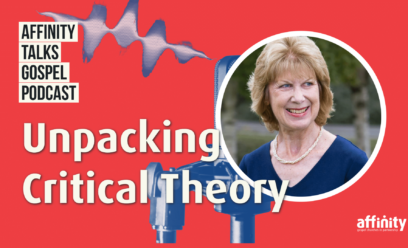Understanding trauma in the context of the church
This article was first published in the Social Issues Bulletin – Issue 53: Summer 2023.

This article describes my experience of living with complex trauma following decades of abuse, (you can read a previous article on understanding abuse here) although the following is relevant whatever the cause of the trauma. This is not professional advice, just one person’s perspective and understanding, born out of personal experience, of how to help someone suffering trauma.
What is trauma?
Trauma is a deep emotional wound that has been caused by experiencing or witnessing an often life-threatening situation. This could be domestic abuse or violence; violent crime; trafficking; slavery; war; untimely death (especially of a child); miscarriage or broken relationships. These are the common causes, but trauma can be caused by any event in life which leaves a person with an emotional wound that doesn’t easily heal and which impairs their ability to function. In its most invasive and persistent form, it is described as complex trauma or PTSD. It’s pervasive because it can prevent a sufferer from functioning physically, mentally, emotionally, relationally and/or spiritually.
Symptoms can include any of the following:
- flashbacks, in which you are reliving the event
- being terrorised by situations that are not threatening
- always being alert for danger even when there is none
- self-harming behaviours including self-neglect, eating disorders
- nightmares and night terrors
- panic attacks, blackouts
- trouble concentrating
- memory loss
- irritability, angry outbursts, mood swings or seeking isolation
- uncontrollable grief that cannot be regulated
- detachment, feeling as though you are living someone else’s life
- emotional numbness or inability to feel any kind of emotion
- guilt or shame
- suicidal thoughts
This isn’t an exhaustive list and sufferers may experience one or many of these symptoms in sequence or simultaneously. On many occasions and in different contexts, a sufferer may be able to function normally or even at a high level, because a process of fragmentation means that the trauma can be isolated and contained until it’s triggered.
Triggers are events that cause a flashback to the original event. These are different for everyone and are impossible for anyone supporting a sufferer to predict. They can include sounds, smells, words, music or a particular item. Here a just a few triggers that relate to everyday things that you think nothing of:
- sleeping in a bed: location of violent assault
- having a bath: being held underwater
- taking a shower: being locked outside in the rain in minimal clothing
- backfiring car: gunshots
- the smell of fast food: living above a fast food outlet whilst experiencing abuse
- a screaming child: the screams of their own child following an accident that resulted in the child’s death
- a song: particular resonance with a relationship
These are just a few examples. Many of them relate to memory buried deep in the senses. A trigger causes an adrenaline rush – a sufferer will default to flight, fight or freeze, having to try, at the same time, to remain in control. Processing the reaction may take time; sometimes it’s several days before the pain recedes enough to look at what happened. But look we must, because understanding our triggers is part of recovery.
Hindering recovery within the church
There are broadly three types of response to traumatised people. The first is to look away in the face of indescribable pain. Whilst that’s understandable, we don’t want to have to live like this either! So please become trauma aware (see next section) so that you know how to talk to us.
During the process of recovery, we are often ourselves unable to foresee what might trigger an episode, but it is possible to be aware of the difference between unintentional harm and thoughtless harm. The latter is caused by the second type of response – an attempt to try and make sense of it by providing answers. It is similar to the behaviour of Job’s comforters (Job 4–5; 8;11;15;18;20;22). They thought they knew the reason for Job’s suffering and spared no attempts to persuade him of it. Here are some similarly common responses that I have experienced. Each of them has caused more trauma:
‘You must have committed some sin that hasn’t yet been forgiven.’
This is an old, well-worn answer. It is quite correct to say that all pain is an outcome of sin. Death, disease and illness are a result of original sin and our lives in a broken world. But it is a long stretch to go from original sin as the source of all pain to suggesting that someone’s trauma is a result of personal sin.
‘God is applying His loving discipline.’
Hebrews 12:6 does say that God disciplines those whom He loves, but the conclusion that trauma is therefore a form of discipline conflates two issues. Firstly, discipline involves correction for specific wrongdoing – the punishment should fit the crime. No loving parent would ground their child or send them to their room just in case the child forgets who is in charge. Discipline should teach a child right from wrong, not be used as a tool to control them.
Secondly, God is not responsible for the pain. What parent would ever cause their child suffering by lobbing an obstacle into their life, just to teach them a lesson? And if that is so with human parents, how much more is it so in our walk with God? The evil that hurts us is not thrown into our path by God.
‘God is testing your faith.’
This line of thought derives from a view that God needs to test us in order to find out how faithful we are. If you are a teacher, you will know a lot about the purpose of testing. There are diagnostic tests that show both teacher and pupil what the next steps in learning are and there are terminal tests, designed to assess how much a pupil has learnt. But God has no need to use any kind of test in order to diagnose or assess the state of my faith – he can see the end from the beginning.
‘God must love you very much to allow this pain.’
Let’s suppose, just for a moment, that this is correct. It would mean that if you are not traumatised and I am, God must love me more than you. Where is the biblical justification for God’s love being greater for some than others? And it’s clear from the story of Job that God can allow suffering, but that is not the same as causing it.
Don’t get me wrong here – pain is a point of growth if we allow God to use it as such. I know God much more deeply and in a more real way than I used to. I would not be without the blessing of the years that I’ve lived with trauma. But I do not for one moment think that God caused what happened to happen, or that his love for me is any different now than it was before. I have just learnt more about him. It’s my clarity of focus that has changed, not God.
‘If you trust God, He will heal you.’
This has many barbs to tear into someone who is already suffering. Firstly, it assumes that the person is not already trusting God, or that their faith is somehow lacking and they need to trust more – that is making a judgement about the spiritual condition of another person. Secondly, it makes the suffering person responsible for the continuance of their own pain, which is a cruel suggestion. And finally, it presumes that God always removes pain from our lives. In my experience, he does not. The symptoms listed at the start of this article no longer disable my life, but some things still trigger them and I think they always will. God asks me to be faithful, not successful. Faithfulness is not about healing from the pain; it’s about how I respond to God through it. Whether or not I am healed is secondary.
‘God is allowing this to bring glory to his name.’
We are not puppets whom God manipulates to his advantage. As with everything in life, when we are in pain, we have choices. God created us with free will, so there cannot be a guaranteed cause and effect in which testing always results in glory – it can equally result in bitterness and anger. We can listen to the prompting of the Holy Spirit, turn to God and allow him to help us grow closer to him through the trauma and that will certainly bring glory to God. But we can also choose to become bitter and blame God for what has happened. While God can turn evil back on itself to bring glory to his name, we have to allow him to do so. He will never force us to look towards him, much less manipulate our lives simply for the purpose of his glory.
People who are trauma aware (the third type of response) are always very careful of what they say and how they say it and they listen much more than they speak. Whilst the reality is that triggers are different for each person, please don’t be wary of us as that hinders the development of meaningful relationships and leaves us feeling marginalised. We might cry. We might even howl in pain, but we won’t disintegrate.
How can a church support recovery?
Become trauma aware.
Once you are aware of what trauma is and the impact that it has on our practical and spiritual lives, you will understand how to interact with us. God is a relational God and it is through relationships that trauma sufferers can be supported. Here are some suggestions that could be helpful in pastoral care.
Understand why a person might seem to be behaving oddly or even irrationally. Sitting still is hard work. Traumatised people are often hypervigilant, constantly seeking for safety and coping with uncomfortable adrenaline rushes. You may think we’re having a meaningful conversation, but I’m trying to escape before a panic attack kicks in and I black out or break down in front of you.
No two people walk the same path through trauma – we each have to find our own way and we need people walking alongside us. Isaiah 43:19 says: ‘See, I am doing a new thing! Now it springs up; do you not perceive it? I am making a way in the wilderness and streams in the wasteland’.
God makes a way through the wilderness for us but we each need to perceive that way for ourselves. He will do a new thing even in the most broken of lives. But God does not give reasons for, or promise to change, the wasteland – he promises instead to make a stream flow through it to make passing through the wasteland bearable. Walk through the wasteland with us and sit in the dust with us during the times when we can’t carry on, just as God told Elijah to eat and sleep when his natural resources were exhausted by fear and loneliness (1 Kings 19).
Support us as we try to make an active choice to accept the trauma and its cause. Show us, maybe in practical ways, that there is peace beyond the pain and love beyond the fear. This is important because denial, avoidance and even resignation can lead to the writing of a victim narrative which gradually becomes the sole explanation for our pain and that, in turn, then leads to anger and bitterness.
We can see from glimpsing into Christ’s reaction as he faced death that even he wanted to avoid pain and suffering – it’s a normal human response. But to acknowledge God’s sovereignty in our pain is a spiritual response, to accept that:
I am God, and there is no other; I am God, and there is none like me. I make known the end from the beginning, from ancient times, what is still to come. I say, ‘My purpose will stand’ … What I have said, that I will bring about; what I have planned, that I will do. (Isaiah 46:9–11)
Sometimes, it’s easier to feel defeated, to blanket ourselves in self-pity or to rail against the injustice of it all – to keep our brokenness in the shadows and to justify ourselves for doing so. But we are not left to bring our pain into the light of God’s blessing alone when we are part of a loving community.
The practice of lament is a powerful way to help someone bring their trauma into the light. Lament isn’t a misery memoir or a moaning session. Lament is a deeply personal act of faith which affirms our attachment to God and our trust in his grace, love and sovereignty. It’s exactly what Job did. He asked God why he was suffering. He asked God why he seemed to be silent. He desperately wanted to die. And yet all of Job’s cries are punctuated with statements about the sovereignty of his God, most memorably when he declared, ‘I know that my Redeemer lives’ (Job 19:25).
Psalm 13 offers us an example of lament which is very clear and precise in its construction. It begins by addressing God with a direct question, ‘How long, LORD?’ David then goes on to tell God what is causing him pain – he feels forgotten by God, as though God has hidden from him. Notice that David doesn’t wallow in self-pity, question God’s integrity or try to apportion blame.
Next, David makes his specific request. He doesn’t dress it up. He uses imperative verbs ‘Look on me and answer’ (v 3) because he is confident that God is listening, even if David cannot see him. He can be bold in his request because he worships a God who is faithful and on whose promises he knows he can rely, even if his feelings don’t confirm it. He ends by singing God’s praises because God has been good to him in the past, so he has confidence for the future. He cries out to God expecting an answer. So, maybe help someone living with trauma to form their own lament.
Be trauma informed
This is about how you design your church structures to support traumatised people. Churches are disability informed when it comes to physical disability, but the same is not often true of emotional disability.
The following actions are all helpful:
- Form a focus group. This could include not just trauma sufferers but those with additional needs, mental health problems, autism or other ways of being that are different. Meet together occasionally and ask about how their lives in the church community could be made easier or more accessible. This is vitally important if your church is planning significant changes to its structures or practices.
- Appoint an elder who is responsible for vulnerable people and get someone trained in trauma impact, symptoms, responses and care.
- Ensure that your policies and how you articulate your doctrines don’t cause more trauma.
- Offer a safe space in the building where anyone experiencing a trauma trigger can go during services or events. Make sure that someone supportive can be with them.
- Create a ‘safe’ group of people who can meet, pray and share together. Not all trauma sufferers can be part of, or access, a home group, so ask them what a supportive alternative might look like.
- Be careful of the language you use when talking to us. Please don’t ever use words like ‘should’ or ‘must’. You don’t walk our path so you don’t know what we ‘should’ be doing or how we ‘must’ respond. If you’re not sure what to say, don’t speak. Make a cup of tea.
There will almost certainly be trauma sufferers in your church, even if they are silent sufferers. If not, there probably will be in the future, as trauma is the growing and deepening problem of our century. Please get trained in walking with us. Be patient with those of us that have complex trauma that may never be fully healed in this life.
The hymn ‘O love that will not let me go’ was written by someone who had just experienced a traumatic change in his life. It’s a moving lament. The writer, George Matheson, started going blind in his late teens and later, as he faced a life of total blindness, his fiancee decided she couldn’t marry him. He wrote the words of the hymn on the eve of his sister’s wedding. She was his carer and her impending marriage triggered a trauma response that resulted in the hymn. In verse 3 he writes:
O joy that seekest me through pain,
I cannot close my heart to thee.
I trace the rainbow through the rain
And know the promise is not vain
That morn shall tearless be.
Please be Christ’s joy in your churches and seek us through our pain.
This article was submitted by an independent, bona fide contributor, who, for safety and privacy reasons, has asked to remain anonymous. We are happy to agree to this request.
Stay connected with our monthly update
Sign up to receive the latest news from Affinity and our members, delivered straight to your inbox once a month.



